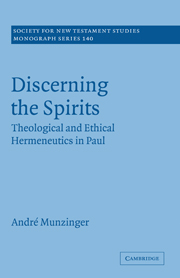Book contents
- Frontmatter
- Contents
- Preface
- Abbreviations
- Part I Introduction
- Part II What Requires Discernment? The Objects of Evaluation
- 2 The Discernment of Ethical Questions
- 3 The Discernment of Spirits
- 4 Discerning All Things: The Structure of Paul's Epistemology
- Part III How Can and Should True Discernment Take Place?
- Part IV Conclusion
- Bibliography
- Author Index
- Passage Index
- Subject Index
3 - The Discernment of Spirits
Published online by Cambridge University Press: 26 October 2009
- Frontmatter
- Contents
- Preface
- Abbreviations
- Part I Introduction
- Part II What Requires Discernment? The Objects of Evaluation
- 2 The Discernment of Ethical Questions
- 3 The Discernment of Spirits
- 4 Discerning All Things: The Structure of Paul's Epistemology
- Part III How Can and Should True Discernment Take Place?
- Part IV Conclusion
- Bibliography
- Author Index
- Passage Index
- Subject Index
Summary
Introduction
The ‘discernment of spirits’ in 1 Cor. 12.10 has caught the attention of scholarship throughout the centuries of Bible reading. In this chapter I need to deal in a detailed manner with this gift. Of particular interest is that some scholars have attempted to call into question Paul's request for discernment. Accordingly, it has been argued that a critical evaluation cannot be meant, since Paul does not believe that spiritual manifestations are ambivalent. Hence, G. Dautzenberg particularly has confined the gift to a process of interpretation of prophetic utterances. On the other hand, others have highlighted the need for critical investigation and evaluation of all manifestations. Consequently, a number of questions arise: does Paul or does he not call for an appraisal which will challenge and examine the subject and content of spiritual utterances? Would such an investigation endanger the community? How can positive impulses be differentiated from negative ones? My research must address these questions. Furthermore, I will keep in mind what we noted in the introductory chapter. There we saw that Stuhlmacher, Käsemann and Beker saw the gift of discernment in the broad sense of theologising, but they did not offer evidence for their case. Can the gift be interpreted as broadly as they do?
In order to answer these questions, three different aspects require investigation.
- Type
- Chapter
- Information
- Discerning the SpiritsTheological and Ethical Hermeneutics in Paul, pp. 45 - 74Publisher: Cambridge University PressPrint publication year: 2007



